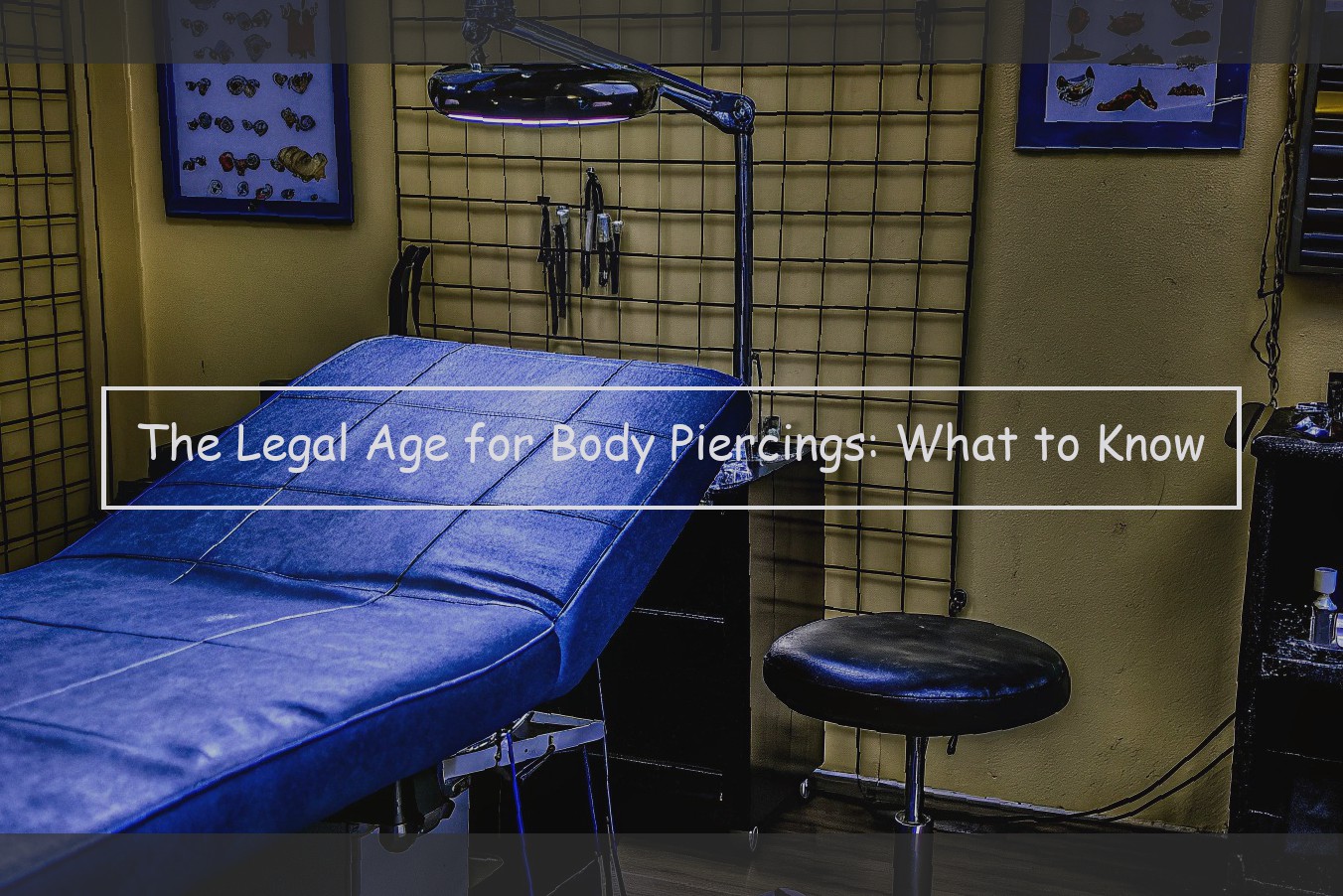
Piercing Legislation Explained
The age at which you can legally get a piercing without permission varies greatly from jurisdiction to jurisdiction. In some areas, you must even attain the right legal age to get a piercing in order to be allowed to pierce someone else who does not have the proper age. Generally, the average legal age for a person to receive a basic or non genital piercing is between 10 and 16, and the most common age is 14 years old. Of course, there are exceptions; you can get a piercing as early as 9 in Nevada , as late as age 21 in Iowa or in some areas of Alaska, or even if you are legally considered an adult in South Dakota, you might still be prohibited from obtaining your piercing when you demand it. It is imperative to know the specific laws of your jurisdiction. If you are underage and do not follow the rules, you put yourself at unnecessary risk of injury because many states will assume you and your piercer have had permission from a parent or guardian, even if you attempt to negotiate them into signing a release form after your piercing is done.
How Laws Differ on a Country and State Level
In many states around the world, there are laws that specify a minimum legal age for piercing procedures. Generally speaking, in most regions that have age restrictions on body piercings for minors, the laws apply to piercings done on any part of the body other than the ear, which generally can be done with parental consent once the child is six years of age.
Canada
Piercing a child’s body – aside from his or her ears – without written permission of a parent is illegal in some parts of Canada. A number of years ago, a piercing artist was fined $800 in Toronto for giving a five-year-old girl pierced nipples. To be fair, piercing a child’s body without a parent’s consent is legally wrong.
American states vary, but there are some states that have very specific laws related to ear and body piercings. For example:
Alabama: An Alabama state law forbids ear piercings on children under two years of age. If you want a child to get its ears pierced at age three, your medical provider is required to document her desire for the procedure in her medical record.
Illinois: Municipalities have the right to set different ages for children to get their ears pierced. Currently, the law for Chicago specifies that ear piercings can only be performed legally if the child is over 18 years of age.
Massachusetts: State law does not require parental consent for child ear piercings, but this does not mean municipal laws don’t exist.
New Jersey: In a shocking move considering the modern U.S. trends toward having personal freedom of choice, New Jersey passed a law a couple of decades ago forbidding any person under 18 years of age from obtaining body piercings where a needle, piercing gun, barbell, or other instrument is employed to make a hole in the body and insert the jewelry. The bill was authored in response to what the state considered a public health concern at the time.
Parental Consent Laws
The rules around parental consent can also impact the legal age for piercings in certain circumstances. Even if a minor is not of legal age to get pierced without permission, some states allow them to get a piercing if they are accompanied by their parent or guardian. Others can get a piercing with a parent’s written (and in some cases notarized) consent. In order for a minor to get a piercing during a state-mandated age range under parental approval, a parent typically must accompany the minor during the appointment where he or she will sign a form consenting to the procedure.
Even though many states allow for this type of approval for body piercings, it is always best practice to check with the piercing studio beforehand to ensure that such a policy is in place. Some states require certain types of documentation but do not require a parent to approve on site and others have the opposite requirement.
What Types of Piercings Require Parental Consent?
Upon entering a professional piercing studio, you are likely to see a list of the types of piercings they undertake, and the age at which each piercing is permitted. Some shops or piercers, do not have a written policy, but speak their policy on a case by case basis. Generally this will be a combination of a piercer’s own personal philosophy, and their studio’s policy. What it is important to remember is, that even if the piercer has a written policy or not, they have the right to refuse to perform a piercing if they do not feel comfortable with the situation. These guidelines are simply that- guidelines that thought should be put into before coming into the studio.
The AAAA gathers together each year to discuss industry trends and concerns. An industry standard has been set, which strongly recommends not doing cartilage or microdermal piercings on youth under the age of 14. A few other piercings, such as surface piercings and tongue piercings, are best not performed on youth until they are past 18.
The Tragus, tragus, antitragus or anti tragus, is the little flap of cartilage anterior to the entrance of the ear canal. It is possible to get a tragus piercing done at a piercing studio ect from about 14-16-18 depending on studio. This is because it is such a small piece of cartilage, the chances of damaging the cartilage when taking out the piercing are much smaller than other types of cartilage piercings.
A surface piercing is where a perforation is made under the skin, and the jewelry is placed under the skin, instead of through the skin. Depending on the type of surface piercing, these are generally not done until around 18.
Why Do These Laws Exist?
Just like parents want to know why they’re prohibited from helping their kids with homework in school, parents also want to know why there are laws in place that prevent them from giving their kids the green light for any piercing they want. And just like anything else, the answer is complicated and involves a combination of health, safety, and maturity issues.
Health and safety considerations: Piercings aren’t exactly a vital part of keeping you or your child alive. That said, they are still something that has the potential to do real harm if not performed well or the right way. You trust a licensed piercer to use devices and methods that are designed to minimize the risk of infection and ensure the piercing heals quickly and properly. At a minimum, this means using a chem lab’s worth of equipment, complying with a range of federal and local laws, and establishing the strictest possible cleaning and sterilization procedures. Not every piercing studio you can find will have access to everything they need in order to safely perform a piercing on someone who’s just starting middle school. In fact , depending on where you live and how popular piercings are there, most of them won’t. But it’s not just a matter of equipment. There are other factors to consider as well: Maturity: Legal age restrictions are often a byproduct of the government telling people that "you’re not mature enough to make this decision for yourself." The problem is that "mature" means different things to different people. You might think your child is mature enough to get a piercing. But some government employees don’t. There’s not much you or your child can do to tackle this issue. If your area has age restrictions in place for piercings, then there isn’t really much you can say about it—they’re in place, and you’re expected to comply with them. Different communities have different views on what qualifies as a sufficient level of maturity. Even though there are age restrictions in place, you might be able to talk to your piercer about other options.
Consequences of Violating the Law
Failure to comply with age requirements can lead to hefty fines. In some states, this fine can be up to $1,000 per incident. However, these fines can be increased if piercing has been performed to a minor under the age of two and to a minor under the age of 12 with consent of a parent or guardian. The latter scenario can result in fines of up to $7,500 based on severity of the act.
In addition to financial penalties, piercers who pierce minors without consent may also face civil lawsuits.
Furthermore, piercing studios may face closure based on circumstantial evidence. If findings are made that the piercing studio has performed the piercing or tattoo on an underage minor, piercings shall be prohibited up to 3 years. The studio may also be subject to notification to health care licensing boards and ordering of administrative sanctions.
The Future of Body Piercing Legislation
Currently there are conversations and potential plans in New York City and the State of New York regarding a change in their legislation. The Cities of Chicago and St. Louis have introduced new laws that require parental consent for all body piercing for minors. It is unclear where the future may lead regarding further piercing legislation. Advocacy for changing piercing-age legislation has been increasing amongst piercing professionals, customers , and politicians. Many piercing professionals are starting to organize petitions which will be brought before their local government. As more parents experience discrimination at minor piercing facilities that won’t allow them to pierce their child, the more they will rally behind change. While the trend for the near future seems to indicate that piercing legislation will be restructured; only time will tell. Keep your finger on the pulse and stay alert for your local changes as new legislation continues to be proposed and debated.



